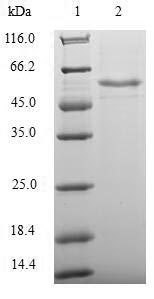Recombinant Human Transcriptional enhancer factor TEF-3 (TEAD4) is produced in an E.coli expression system, covering the amino acid region 74-434. This partial-length protein features an N-terminal 6xHis-SUMO tag, which helps with purification and detection. The product shows a purity level greater than 90%, confirmed by SDS-PAGE analysis. It's designed for research use only and is not intended for diagnostic or therapeutic applications.
TEAD4, also known as Transcriptional enhancer factor TEF-3, appears to play a crucial role in gene expression regulation by binding to specific DNA sequences. It serves as a key component in the Hippo signaling pathway, which controls cell growth and apoptosis. TEAD4 seems instrumental in developmental processes and cellular proliferation studies, making it a significant focus in various research areas.
Potential Applications
Note: The applications listed below are based on what we know about this protein's biological functions, published research, and experience from experts in the field. However, we haven't fully tested all of these applications ourselves yet. We'd recommend running some preliminary tests first to make sure they work for your specific research goals.
Human TEAD4 is a eukaryotic transcription factor that requires precise folding of its DNA-binding domain (TEA domain) and proper conformation for interactions with co-activators like YAP/TAZ. The E. coli expression system cannot provide the eukaryotic-specific post-translational modifications and chaperones necessary for the correct folding of this complex protein. The partial sequence (74-434aa) lacks the N-terminal region and contains a large N-terminal SUMO tag that may sterically interfere with DNA-binding and protein-interaction interfaces. Therefore, this recombinant protein is highly unlikely to achieve correct folding or functional activity.
1. Antibody Development and Validation
This recombinant TEAD4 serves as an excellent immunogen for generating antibodies against linear epitopes of the human TEAD4 fragment. The defined sequence ensures targeted antibody production. However, antibodies may not recognize conformational epitopes on the native, properly folded full-length TEAD4 in cellular contexts.
2. Biochemical Characterization Studies
This is the essential first step to assess the protein's physical properties. Techniques like circular dichroism can analyze secondary structure content, while size-exclusion chromatography can determine oligomeric state and homogeneity. These studies provide critical quality control data but characterize the protein itself, not the native protein.
Final Recommendation & Action Plan
This recombinant TEAD4 fragment is primarily suitable for antibody development and biochemical characterization but fundamentally unsuitable for functional studies due to E. coli's inability to produce properly folded eukaryotic transcription factors. The immediate priority is Application 2 (Biochemical Characterization) to assess the protein's physical properties and folding state. Application 1 (Antibody Development) can proceed immediately for generating linear epitope antibodies. DNA binding requires precise tertiary structure formation that E. coli cannot provide for this eukaryotic transcription factor. For functional TEAD4 studies, use full-length protein expressed in eukaryotic systems (e.g., mammalian or insect cells) that support proper folding and post-translational modifications.






